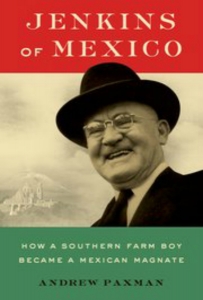In Jenkins of Mexico: How a Southern Farm Boy Became a Mexican Magnate, Andrew Paxman offers a biography of William Oscar Jenkins, who became one of Mexico’s most significant business magnates in the aftermath of the 1910 Revolution. This is a compelling account, writes Ignacio M. Sánchez Prado, that will be invaluable to those interested in the histories of business, cinema, the relationship between Mexico and the United States and the genealogies of contemporary wealth.
Jenkins of Mexico: How a Southern Farm Boy Became a Mexican Magnate. Andrew Paxman. Oxford University Press. 2017.
The subject of Andrew Paxman’s superb biography Jenkins of Mexico is both the book’s blessing and its curse. It is a blessing because a historian would be hard-pressed to find a more fascinating character: a man from the US South who became, in the aftermath of the 1910 Revolution, one of Mexico’s most significant magnates, controlling everything from the agricultural and banking industries to a film exhibition monopoly. It is also a curse, because the fact that Jenkins has not become a household name in the way of analogous business titans (like Andrew Carnegie, Cornelius Vanderbilt or Carlos Slim) may deny this compelling book the wide readership it deserves.
Born in Tennessee farm country and animated by his interest in a Southern belle, William Oscar Jenkins moved to Mexico in 1901 to begin an astonishing decades-long career that turned him into the richest man in the country. The origins of his fortune trace back to his investments in the textile industry in Puebla, where he gradually overcame a local elite that despised him for being American by creating an economy of scale and production which outsmarted the conservative and localist ideology of Porfirian business owners. As the revolution broke, Jenkins proved himself to be an able negotiator with the different political forces in conflict and used his cash liquidity to become a banker of last resort to those whose businesses were threatened and even ruined by conflict.
Facing what Paxman calls ‘Gringophobia’ – a deep resentment of his being American by Mexican counterparts and rivals – Jenkins emerged from the revolution as a business tycoon with no parallel, first developing a sugar empire centred in Atencingo and later creating a significant cinematographic empire based on the monopoly of exhibition and a significant part in the financing of production to credit. Throughout this process, Jenkins became a mentor of Manuel Espinosa Yglesias, who would succeed him as the richest man in Mexico in the 1970s, and established himself as one of the country’s most important philanthropists, contributing far beyond his passing in 1963 to the establishment and long-term sustenance of a major university (the Universidad de las Américas-Puebla (UDLAP)) as well as other endeavours.
 Image Credit: Centro de Convenciones Puebla, Puebla, Mexico (Joaquín Martínez CC BY 2.0)
Image Credit: Centro de Convenciones Puebla, Puebla, Mexico (Joaquín Martínez CC BY 2.0)
The book has all the virtues that one would expect of someone with a trajectory as compelling as Paxman’s. Currently a faculty member in the Centro de Investigación y Desarrollo Económicos (CIDE), a social science think tank in Mexico, Paxman has an academic background in Latin American Studies, literature and particularly history, of which he was a Professor during his time at Millsap College in Mississippi. More significantly, Paxman was the Latin American correspondent for the trade journal Variety and a journalist of Mexico-based English-language newspapers. All of this is obvious in the book. Paxman writes in thrilling prose that combines archival rigour with novelistic style in ways rarely seen in academically-trained historians. He is a born biographer. His previous book, not yet available in English, is a controversial co-authored biography of Mexican media tycoon Emilio Azcárraga Milmo, which has close stylistic and intellectual relations to his work on Jenkins. One of the most admirable aspects of this book is that it is based on research that has spanned for years and juggles with an archive that in some aspects is quite detailed and in others significantly incomplete (many of Jenkins’ papers are lost). The result positions Paxman as one of the top Latin Americanist historians worldwide, both in method and in quality of work.
It is quite difficult to do full justice to the richness of Jenkins of Mexico in the space of a review. In the life of Jenkins, Paxman finds the centre of gravity for a very complex history of business and politics that contributes to a number of historical fields. First and foremost, it is one of the most significant histories of business and modernity in Mexico. Paxman achieves this by moving away from Mexico City and focusing on Puebla, a state that contains Mexico’s fourth largest city, a significant rural area and one of the bastions of Mexico’s Catholic conservatism and right-wing politics. Jenkins’ dealings in Puebla, which include his negotiations with governments of diverse ideological stripes and, at times, his economic assistance to make local economics viable, illuminate the ways in which economic and social practices that the Mexican Revolution was supposed to eliminate came out stronger and consolidated themselves during the post-revolutionary period.
The book is also an essential component to understanding Mexico’s business history in terms of the genealogies of contemporary wealth. As Paxman himself indicates, Jenkins’ mentorship of Espinosa Yglesias precedes the latter’s mentorship of Carlos Slim, who replaced them as the richest man in Mexico today. Jenkins’ philanthropy still stands through the Fundación Mary Street Jenkins, the largest and oldest endowment-based non-profit in Mexico. His political dealings helped established a permanent rule of the Partido Revolucionario Institucional (PRI) and of a political elite that keeps reproducing itself and ruling Puebla. Also, through his role in the founding of the Colegio Americano (a K-12 institution) and UDLAP, he left a deep legacy in the formation of US-style private education.
Beyond these fields, there are two more important dimensions of the Jenkins story I would like to highlight. Jenkins of Mexico is a fantastic read to complement a series of biographies of great (and infamous) US businessmen published in the past decade, including T.J. Stiles’ The First Tycoon (on Vanderbilt), David Nasaw’s Andrew Carnegie, Ron Chernow’s Titan (on John Rockefeller) and David Cannadine’s Mellon. Jenkins of Mexico provides a compelling narrative on the ways in which US Southern values fostered by institutions created by those titans (like Vanderbilt University, which Jenkins attended and which is clearly a model for UDLAP) adapt and thrive when confronted with Mexico’s own conservative values and elites, while the model of philanthropy and capital pioneered by Carnegie and Rockefeller contested the social, state-centred agendas of the Mexican post-revolutionary state.
Perhaps the only quibble I have is that at times Paxman overplays the factor of ‘Gringophobia’ and anti-American sentiment, something undoubtedly present but often nothing but the surface manifestation of discontent with Jenkins’ business practices, which were quite aggressive and unapologetic. His use of loans to weaken business associates and rivals, his bullyish investments in land and his role in the demise of the Mexican film industry are legendary and often read as a consequence of his being American, although the core issue for his detractors seems to be more a matter of business than of identity. Nonetheless, the book is unquestionably a must-read for anyone interested in business history in the Americas as Jenkins provides a case study of the ways in which American business practices transculturate with local economic and social institutions.
A second field for which this book is valuable is media history. The sections devoted to Jenkins’ construction of a film exhibition empire are valuable contributions to the understanding of the Mexican Golden Age of cinema and the difficult relationship of Latin America’s film industries to the Hollywood behemoth. I could further expand on the richness of this study, but I would like to simply conclude this review with an invitation to read this most exciting book: an example of how a biography should be written and a true learning experience for people interested in business, in cinema, in Mexico and in the United States.
- This review originally appeared at the LSE Review of Books.
Please read our comments policy before commenting.
Note: This article gives the views of the authors, and not the position of USAPP– American Politics and Policy, nor of the London School of Economics.
Shortened URL for this post: https://bit.ly/2EHo5sn
About the reviewer
Ignacio M. Sánchez Prado – Washington University in St. Louis
Ignacio M. Sánchez Prado is Jarvis Thurston and Mona Van Duyn Professor of the Humanities at Washington University in St. Louis. He is the editor of thirteen books and the author of six, most recently Strategic Occidentalism. On Mexican Fiction, the Neoliberal Book Market and the Question of World Literature (Northwestern University Press, 2018).


 Find this book:
Find this book: 
